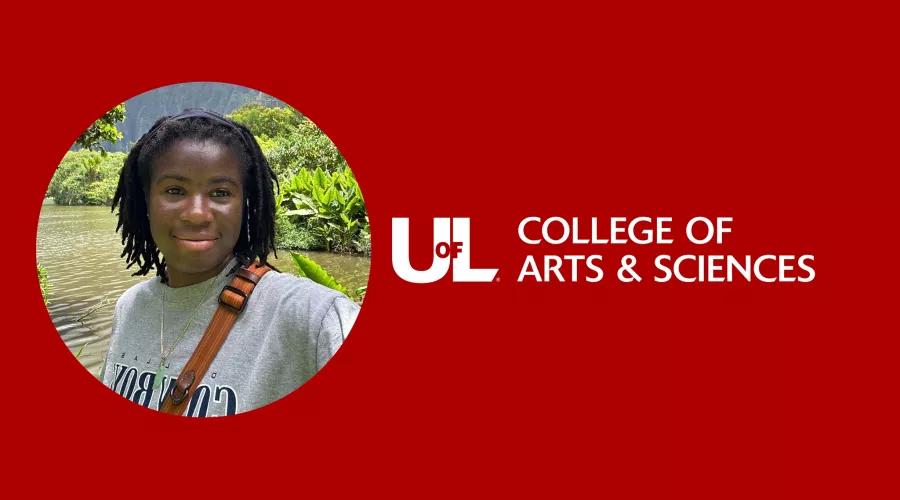From UofL to Oslo: Fulbright Scholar Dammy Jeboda Connects Psychology, Privacy, and Public Health
July 30, 2025
By Stephanie Godward, Communications and Marketing Director, College of Arts & Sciences
Oluwadamilola (Dammy) Jeboda — a 2025 graduate of the College of Arts & Sciences — has been awarded a prestigious Fulbright research grant to study decision-making and intergroup helping behaviors in Norway.
As a psychology major with minors in philosophy and applied statistics and data science, Jeboda will spend the upcoming year conducting this research at the University of Oslo. The Jones Scholar and Outstanding Honors Graduate was also honored by the Phi Beta Kappa Association of Kentuckiana as the Outstanding Graduate from UofL.
Jeboda's path to becoming a Fulbright scholar included an eye-opening international research experience in Malawi during the summer of 2024, funded by UofL’s Etscorn Summer Development Award.
“My time in Malawi has been full of unique and exciting experiences. I’ve been able to apply my interests and curiosities to an entirely new field through researching the public opinion of wastewater-based epidemiology in Malawi, and how public health surveillance/privacy concerns may differ from those in the United States,” Jeboda said.
The eight-week program, led by Dr. Rochelle Holm of UofL’s Christina Lee Brown Envirome Institute and funded by the National Science Foundation, brought together students from UofL and North Carolina State University to explore water, sanitation, and hygiene systems in a global context.
While much of the research focused on scientific and technical data collection, Jeboda added an interdisciplinary angle rooted in psychology.
“I’ve always been interested in psychology, and I think pairs naturally with other fields of study,” she said. “I also think that so much of public health can be related to behaviors on a large scale. If we can better understand those behaviors, we can better implement solutions to increase public health.”
Drawing from her coursework and curiosity, Jeboda designed a project that examined cultural and behavioral attitudes toward personal health information. Her work in Malawi built on previous U.S.-based public health surveys and pushed into new territory using an innovative method — a board game.
“The board game that I created was based on contingent analysis (how much an individual is willing to pay/give up for a non-market good),” she said. “For the board game, participants were allotted 100% of their privacy. As they progressed, they were asked to give up a percentage of that privacy in exchange for things that would increase their personal health and/or the health of those in their community.”
The game-based approach helped Jeboda compare how people interact with abstract health trade-offs when they’re presented in a more visual and interactive format.
“Using a game that people have never played before had its advantages and unique challenges,” she explained. “But the board game engaged people in a way that the survey didn’t, and it helped me learn more about how different research methods can be better suited for answering certain research questions.”
Her research was featured at the Kentucky Honors Roundtable (KHR) at UofL this past spring.
“KHR gave me more confidence in sharing my ideas, and a chance to present my findings and key takeaways,” she said. “It was nice to discuss my research, answer questions, and help people learn more about research being done in low- and middle-income countries.”
Jeboda says the experience in Malawi helped her grow as a researcher and develop the mindset she will carry forward into medical school.
“My time in Malawi taught me a lot about research design and implementation. It also gave me the opportunity to work towards becoming an expert in subject matter,” she said. “Before this project, I knew very little about wastewater-based epidemiology, and privacy concerns regarding personal health information. But I knew that the more I could learn in preparing and designing this project, the better the outcome would be. This is a skill that I hope to take with me as I continue as a researcher and a medical school student.”
The Malawi trip also included service-learning, such as Girls Science Day — a STEM-focused event for 250 elementary-aged girls focused on wastewater, sanitation, and virus prevention. Jeboda and her fellow students worked alongside local teachers to foster excitement about science and empower the next generation of public health advocates.
When asked what advice she has for other students interested in global or interdisciplinary research, Jeboda offered this:
“Don’t count yourself out! It’s easy to see a description for a project that’s geared towards a specific discipline and think that it’s not for you, or that you won’t be selected. But having interdisciplinary backgrounds can be an advantage,” she said. “Also, to lean into whatever you are curious about. Interesting work is often the most gratifying, so if there is something that genuinely piques your interests, it might be worth pursuing.”
From her hometown of Frisco, Texas, to Louisville, Malawi, and now Oslo, Jeboda exemplifies the power of curiosity, compassion, and crossing disciplines — shaping a future in medicine and global health, one thoughtful question at a time.
Related News




